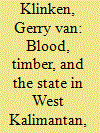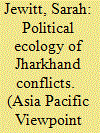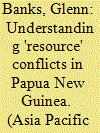|
|
|
Sort Order |
|
|
|
Items / Page
|
|
|
|
|
|
|
| Srl | Item |
| 1 |
ID:
080811


|
|
|
|
|
| Publication |
2008.
|
| Summary/Abstract |
West Kalimantan (West Borneo) has a history of violent communal conflict.1 It also has extensive forests that have been looted for decades. The argument will be that these two are linked, but not by the grievances of the forest dwellers. Except in its first few days, the two main episodes of 1997 and 1999 were not driven mainly by grievances among marginal groups. Rather, explanations based on the 'resource curse' carry more weight. These focus attention on the contested nature of the state, rather than on rebellious activities of marginal groups. When state institutions were thrown into disarray by the sudden resignation of President Suharto in 1998, Dayak militants already close to state power rewrote the rules of local politics by demonstratively 'cleansing' certain areas of an unpopular immigrant minority. This theatrical manoeuvre impressed political rivals sufficiently to allow Dayaks to gain control over several timber-rich districts, which had a thriving black economy. Malays later imitated these techniques to stem the tide
|
|
|
|
|
|
|
|
|
|
|
|
|
|
|
|
| 2 |
ID:
080809


|
|
|
|
|
| Publication |
2008.
|
| Summary/Abstract |
On many measures of ethno-linguistic diversity, Papua New Guinea is the most fragmented society in the world. I argue that the macro-level political effect of this diversity has been to reduce, rather than increase, the impact of ethnic conflict on the state. Outside the Bougainville conflict, and (to a lesser extent) the recent upsurge of violence in the Southern Highlands, ethnic conflicts in Papua New Guinea have not presented a threat to national government. In contrast to most other ethnically diverse societies, the most consequential impacts of ethnic conflict in Papua New Guinea are at the local level. This paper therefore examines the disparate impacts of local- and national-level forms of ethnic conflict in Papua New Guinea.
|
|
|
|
|
|
|
|
|
|
|
|
|
|
|
|
| 3 |
ID:
080815


|
|
|
|
|
| Publication |
2008.
|
| Summary/Abstract |
Resource conflicts often intensify ethnic violence and vice versa. However, in specific cases situations can be more complex than they appear. To understand this phenomenon, this chapter takes incidents of violence in Northern Thailand as a point of departure to explain how the historical construction of ethnic identification is tied to the spatial division of highlands and lowlands. I argue that these incidents of violence are not just about resource scarcity but also about notions of forests and highlands as places of wildness and lowlands as the source of civilisation. The current adoption of a nature conservation discourse among Thais puts forests and hills into a battlefield of perceived resource degradation. Some situations have been aggravated to the point that violence has been perpetuated against ethnic highlanders by lowlanders who have adopted orthodox science and nationalist sentiments drawn from a history and geography of ethnic identification. Taking a political ecology approach, this article highlights the interplay among resources, access rights, identity, history, polity, and space to unveil the complexity and specificity of ethnic violence
|
|
|
|
|
|
|
|
|
|
|
|
|
|
|
|
| 4 |
ID:
080808


|
|
|
|
|
| Publication |
2008.
|
| Summary/Abstract |
The papers in this special issue are the product of a comparative interdisciplinary workshop on 'Natural Resources and Violent Ethnic Conflicts in the Asia Pacific Region' held in Honolulu, Hawaii, 18-20 March 2005. The workshop brought together scholars who study conflicts between ethnic groups and those who study conflicts over natural resource claims in order to examine the interplay of resources and ethnicity and to seek answers to the question of why violence occurs in some cases and not in others. Both sets of scholars agreed on some points but disagreed on others. They agreed that ethnic and resource grievances occur not so much out of objective deprivation but out of 'relative deprivation' when groups compare their situation with others, to the past, or to future expectations. They both stressed the role of democratic processes in alleviating resource competition and ethnic conflicts - but they did this in different ways. The perspectives and solutions offered by these papers sum to a deeper and more contextualised understanding of the cause of conflict and to mutually reinforcing solutions for resolving them.
|
|
|
|
|
|
|
|
|
|
|
|
|
|
|
|
| 5 |
ID:
080813


|
|
|
|
|
| Publication |
2008.
|
| Summary/Abstract |
Although India's Jharkhand movement resists classification as either an ethnic or an environmental movement, it has, at different times, mobilised clear elements of both with frequently violent outcomes. This paper examines the movement from a political ecology perspective and focuses on violence arising from natural resource-related grievances, notably land alienation, forest policy and employment from Jharkhand's mines. Drawing from political ecology's emphasis on the need to examine conflict from a range of different spatial scales, the paper emphasises the importance of a micro-political ecology approach for understanding how locally based conflicts over natural resources can harden into more established grievances that can be mobilised politically as part of a wider and potentially violent protest movement. It is also suggested that micro-political ecology approaches can assist participatory resource management initiatives in ameliorating local conflicts over access to resources, thus helping to prevent them from escalating into more widespread violence.
|
|
|
|
|
|
|
|
|
|
|
|
|
|
|
|
| 6 |
ID:
080812


|
|
|
|
|
| Publication |
2008.
|
| Summary/Abstract |
This paper uses a political ecology perspective to examine relationships between violence and territory in West Kalimantan, focusing on the violent incidents of 1996-1997 and 1967-1968. Besides a regional account, the paper examines some of the ways residents of one village were drawn into and chose to participate in violence. The author concludes that while regional analyses can identify broad patterns, local analyses enable a greater understanding of both variation and the processes by which ethnic categories are constructed through violence.
|
|
|
|
|
|
|
|
|
|
|
|
|
|
|
|
| 7 |
ID:
080814


|
|
|
|
|
| Publication |
2008.
|
| Summary/Abstract |
Jharkhand is at the centre of India's struggles to define 'the environment' and 'economically relevant natural resources'. Although cultural labels are applied by leaders who seek influence in these struggles as well as by many of those people who listen, an ethnonational analytic frame does not help answer the questions: How, why and when has the political idea of environment changed in India? When and why has the Jharkhand movement chosen violent tactics? When and why has the Jharkhand statehood movement realised electoral success? Or, why was Jharkhand state formed? To address such questions, a long range historical-institutional approach is much more fruitful
|
|
|
|
|
|
|
|
|
|
|
|
|
|
|
|
| 8 |
ID:
080810


|
|
|
|
|
| Publication |
2008.
|
| Summary/Abstract |
Papua New Guinea, with its heavy dependence on natural resources, limited economic development in the past two decades, poor record of governance and high-profile separatist conflicts such as the Bougainville civil war, appears to be an exemplar of the 'Resource Curse' theory - the notion that natural resources actively undermine economic development. Using a number of examples from a range of scales, this paper argues that what appear to be 'resource' conflicts in Papua New Guinea are actually better conceived as conflicts around identity and social relationships. The very different conceptualisation of natural resources in most Melanesian societies - as elements of the social world as much as any external environmental sphere - means that resources become a conduit for local social and political agendas and tensions to be expressed. The nature of traditional conflict in Melanesian societies is discussed as a guide to the better management and resolution of what appear to be 'resource' conflicts in Papua New Guinea.
|
|
|
|
|
|
|
|
|
|
|
|
|
|
|
|
|
|
|
|
|